
It's not just truckers that will have to spend a lot of money to retrofit their diesel engines. And quite a few trucks on California roads will actually be unaffected by a new California diesel regulation.
The California Air Resources Board is expected to vote on a new diesel-emissions regulation when the board meets on December 11 and 12 in Sacramento. As Dan Sperling, head of the Institute for Transportation Studies at UC Davis, explains in this clip, diesel trucks haven't been regulated the same way cars have been.
[jwplayer config="QUEST Audio Player" skin="http://ww2.kqed.org/quest/wp-content/themes/quest/glow.zip" file="http://www.kqed.org/.stream/anon/quest/radio3-10_GetSootOut_blogextra3.mp3"]
It would require all trucks on California roads to meet the lower 2010 emissions standards. The cost to retrofit a diesel truck could run anywhere from $10,000 to $25,000 per truck. There are roughly a million diesel trucks driving through the state – but not all of them are going to get the retrofit.
About half of the trucks traveling through California are from out of state. And almost all of those are long-distance freight trucks, which drive so many miles that they only last about three years – so most of the out-of-state trucks will meet 2010 standards in time.
